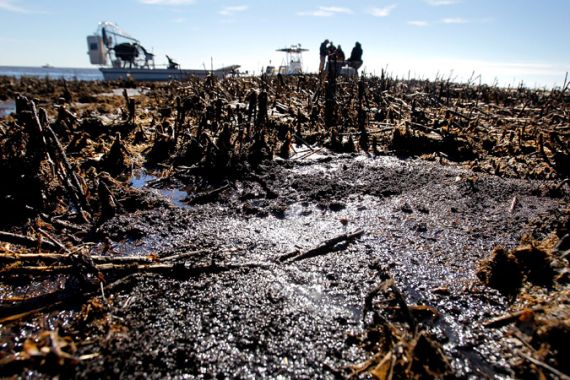BP oil disaster: People still reeling from impacts
There should be vigilance along the US coast of the Gulf of Mexico to expose and address the impacts of BP oil disaster.

New Orleans, LA – Some call the Gulf of Mexico the United States’ energy coast, while others call it the nation’s energy sacrifice zone. It is undeniable that the Eastern Gulf has shouldered damaging and environmentally careless energy development in the past and is the primary domestic target area for new development. From liquefied natural gas terminals to oil and gas drilling in the outer continental shelf, the Gulf bears a heavy burden. One need only look at the ongoing BP oil drilling disaster.
The Gulf region and its people are well aware of the true environmental costs associated with the world’s reliance on oil and gas: the devastation of Louisiana’s coastal wetlands, oil spills, refinery pollution, sea level rise and increasingly intense hurricane seasons. The coast and its communities have faced these realities for far too long and will continue to do so.
Keep reading
list of 4 itemsIsland states win historic climate case in world oceans court
This researcher found billions in ‘invisible’ gold in Jo’burg’s mine dumps
Are seed-sowing drones the answer to global deforestation?
|
|
Despite BP’s fancy multi-million dollar ad campaign saying everything is okay, the Gulf and its people are still reeling from the impacts of the worst environmental disaster in US history.
Fishermen are out of work; shrimp and oyster harvest numbers are way down; marine mammals, especially dolphins, wash in on a daily basis, dead; Gulf fish with lesions consistent with exposure to oil toxins are increasing rapidly; humans, especially those who worked on BP’s “vessels of opportunity” programme are sick and tests reveal high levels of hydrocarbons in their blood; social problems associated with communities who have been exposed to a disaster are on the rise; and on and on and on. The damages resulting directly from BP’s drilling disaster are real, they are current and they are widespread.
For some along the Gulf coast, the recent partial settlement between BP and the plaintiffs’ steering committee is big (and hopefully good) news, but this step does not resolve any of the legal issues surrounding environmental damage and large-scale restoration of the Gulf.
BP and their co-defendants remain on the hook for fines, stemming from the Clean Water Act and other environmental laws, of potentially more than $20bn – and the government must hold BP and others fully accountable for damages to the marine ecosystem, our coasts and wildlife.
While a prolonged trial pitting federal, state and local governments against BP looks likely, it is imperative that Congress act quickly to ensure Clean Water Act fines resulting from the BP drilling disaster are directed to restoration of the Gulf environment.
The first Clean Water Act settlement with a BP drilling disaster related entity, MOEX, directed less than 25 per cent of fines towards Gulf conservation initiatives, an unacceptably low precedent. BP will also still need to pay an as-of-yet undetermined amount for the Natural Resources Damage Assessment and subsequent recovery efforts that come out of that process, which is designed to return the Gulf environment to its pre-disaster state.
|
“BP and their co-defendants remain on the hook for fines, stemming from the Clean Water Act and other environmental laws, of potentially more than $20bn…” |
The announced partial settlement does not address protecting the Gulf from future disasters. Any potential settlement between government and BP should include funding for a Gulf of Mexico Regional Citizens’ Advisory Council to give impacted communities a voice in ensuring that oil and gas operations pay proper heed to safety and environmental laws.
I hope that the announced partial settlement puts Gulf communities on a path to becoming whole again, but many questions remain. Holding BP accountable for environmental damages and jump-starting long-needed restoration of the Gulf is critical to the future of our communities, our environment and our Gulf.
The Gulf region needs the Federal government to hold a hardline and demand that BP pay fines associated with the independently assessed oil spill volume and gross negligence, neither of which BP’s going to be terribly interested in doing, but both of which are slam-dunks in a court trial.
Over the past few weeks, there has been renewed attention down here in the Gulf region, thanks to the planned BP trial and eventual partial settlement. Still, when the media is away and attention turned to another disaster, perhaps in someone else’s Gulf somewhere else in the world, vigilance is needed along the US coast of the Gulf of Mexico to ensure that the ongoing impacts of the BP disaster are documented, exposed and addressed. The oil is still here and so are we.
Jonathan Henderson is the Coastal Resiliency Organiser for the Gulf Restoration Network. For more information, visit healthygulf.org
